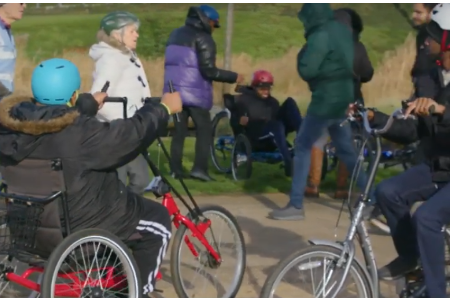
Cycling to improve mental health aims to encourage and engage people with mental health issues to cycle – building cycle confidence and skills. The programme holds 20 three-hour sessions a year with 5-6 people per session and four groups per year. These sessions are held at the accessible Leo Valley Velo-Park and the Queen Elizabeth Olympic Park.
The project has created all-ability cycling sessions using tried and tested adapted bikes and has established a five-week course for young people. Working alongside Children and Adolescent Mental Health Services (CAMHS) Hackney, the young participants are either service users or known to the service. Bikeworks in the Park has also established a relationship with the East London NHS Foundation Trust (ELFT) to engage people with mental health issues, particularly those diagnosed with, or considered at risk of developing psychosis.
The project has measured how their activities have had an impact on wellbeing using the Warwick Edinburgh Mental Wellbeing Scale (WEMWBS). In addition to this, a ‘Cycling for Wellbeing Board’ has been set up as well as a mental health steering group allowing service users involved to make decisions and provide valuable input in the project.
At the end of the programme the bikes are gifted to the participants, so that they can cycle independently.
All the instructors are local, most are women, and all are trained and experienced in working with people with learning difficulties and autism.
Target audience and engagement
• The key target audience is people with mental health issues, particularly those diagnosed with, or at risk of developing psychosis, as well as children and adolescents with mental health issues
• Promotion is mostly through Mental Health Services who refer people to the cycling sessions
• Participants with mental health issues have the opportunity to join the steering group to help make decisions about marketing tools and making decisions about the finer aspects of delivery, in essence to co-design the programme
Reach
• Small (20-30 participants)
• Geographically- accessible green spaces
Equipment needed
• Bikes of various sizes
• Accessible or adapted bikes
• Helmets of various sizes
Resources needed
• Cycle Instructor:
-Run the cycling sessions
-Ensure participants feel confident and well looked-after
-Must be a qualified and experienced instructor trained to work with people with learning difficulties and autism. Preferably also trained to work with people with mental health issues
• Project Leader:
-Oversee the project ensuring the participants feel safe and are enjoying their time
-Ensure all funding criteria and documentation is met (if required)
-Run risk assessment for safeguarding, injuries and to identify any other concerns which may affect project delivery
-Gather feedback from participants
-The Project Lead should have the requisite level of DBS and understand health and safety needs (preferably First Aid trained)
• Access to Mental Health Services:
-To provide extra support to participants
• Volunteers:
-Help participants with the sessions and provide encouragement
-Contribute to overseeing activity and potentially fix any equipment issues
- Be part of the steering groups to co-design the programme
• Storage space:
-You will need somewhere to store the bikes. This can be at a community centre, or perhaps another local business that has storage room. Your Council may be able to provide you with information on who to contact. You could also use a shipping container, see if anyone is willing to lend you one, otherwise you could buy one as a last resort. Try to keep this as close to the location of the sessions as possible
Estimated project costs
• Adapted & accessible bikes (x40 bikes at £120 per bike) £4,800
• Staff training (10x staff, £50 per day, for 4 days) £2,000
• Management/administration £1,550
• Delivery costs (2x instructors per session at £25 per hour - £150 per 3hr session) £9,000 (60 sessions over 3 years)
Top tips/key learnings
• Get participants involved in goal setting and safety planning to really encourage a co-design of the programme
Maximising local contacts
• Utilise local services and networks to recruit participants or even get in kind support. (Disability groups, volunteer organisations and local centres, community centres, schools, etc.)
This project idea was provided by Bikeworks - Twitter - Instagram
If you decide to run your own version of this project in your community, please email us at wcgl@groundwork.org.uk. We love to hear that we are inspiring people to walk and cycle.